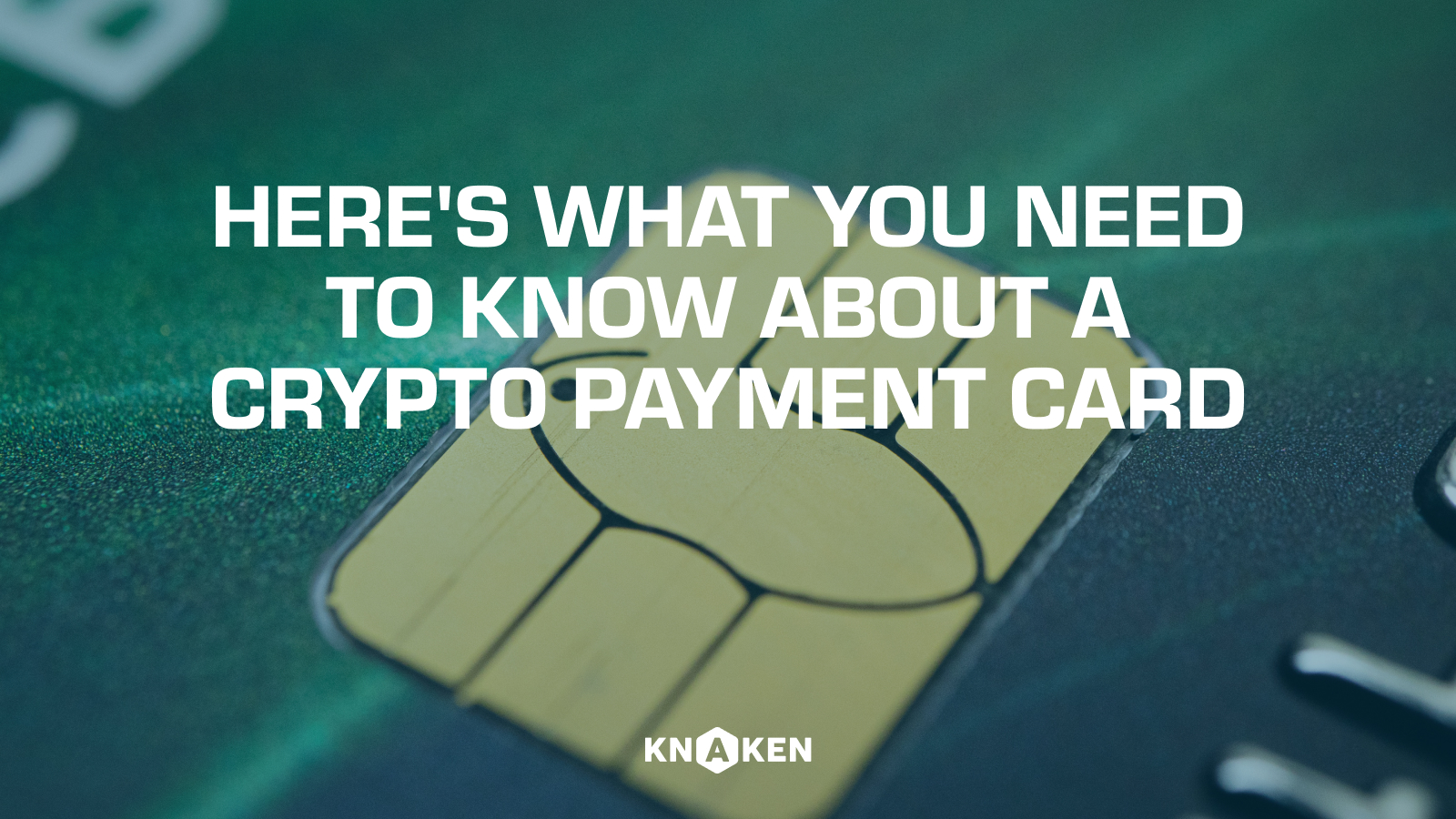Here's What You Need to Know About a Crypto Payment Card
The fact that crypto has become indispensable is evident from its tremendous surge in popularity among people. The number of people possessing crypto has greatly increased in recent years. Despite lots of new legislation revolving around this still somewhat controversial form of money, we see that we can no longer ignore it. In fact, we can now pay with it at an ever-growing number of places. We already knew you could buy a Tesla with Bitcoin, but did you know you can also pay at the supermarket, baker, and butcher with your crypto payment card? The chances that the baker or butcher has no idea how this works are quite high, but they don't need to because it doesn't affect them. As we can imagine that all sorts of questions might be running through your mind, we will explain how it precisely works in this article.
What is a Crypto Payment Card?
A crypto payment card is essentially nothing more than a debit card/prepaid card from a certain crypto platform. These platforms are in turn connected to major payment systems, enabling payments. These cards are equipped with an NFC tag, just like a debit card, allowing the card to communicate with other systems. This technology has been in use for years, as in our debit cards, but also in clothing labels, for example. The addition of stickers with NFC tags triggers an alarm when someone leaves the store without paying. Whereas it was much more difficult to pay with crypto until a few years ago, it has become much easier today. The retailer receives their money, just like when you pay with your bank debit card.
Are there any fees involved?
The benefits of a crypto debit card are, of course, huge. However, there are still a few crucial points we want to discuss. What we see is that there are countless providers of this type of payment cards. It's extremely handy to choose the most affordable party, but the downside is that you have no safety net if, for example, the issuer goes bankrupt. Unlike a bank, your capital is therefore not insured. Another consideration is that many cryptocurrencies need to be locked in for an extended period. This means that you can't sell them during a significant increase in value. If we look at the cost per transaction, these are often substantial. Aside from the costs per transaction, annual fees are often charged for card usage.
Can anyone create such a card?
With current technologies, you too can create a card that allows your customers to pay. Now there are various laws and regulations to adhere to, but it can be done in the form of a credit or loyalty card if you have a store. For example, you can get Plastic cards made at DCP, which are equipped with this NFC technology, and they can even help you set up a customer loyalty system. So, in theory, you can also create a card that allows your customers to pay, but getting all the regulations in order that you are linked to a payment system like Visa is not only extremely expensive but also takes a lot of time.
Discover more blogs ALL COINS
ALL COINS
 Bitcoin
Bitcoin
 Ethereum
Ethereum
 Tether
Tether
 BNB
BNB
 Solana
Solana
 USD Coin
USD Coin
 XRP
XRP
 Dogecoin
Dogecoin
 Cardano
Cardano
 Shiba Inu
Shiba Inu
 Avalanche
Avalanche
 Tron
Tron
 Polkadot
Polkadot
 Bitcoin Cash
Bitcoin Cash
 Chainlink
Chainlink
 Polygon
Polygon
 NEAR Protocol
NEAR Protocol
 Internet Computer
Internet Computer
 Litecoin
Litecoin
 Dai
Dai
 Uniswap
Uniswap
 Aptos
Aptos
 Ethereum Classic
Ethereum Classic
 Hedera
Hedera
 Cosmos
Cosmos
 Pepe
Pepe
 Filecoin
Filecoin
 Immutable X
Immutable X
 Stellar Lumens
Stellar Lumens
 Stacks
Stacks
 Render
Render
 Arbitrum
Arbitrum
 Sui
Sui
 VeChain
VeChain
 Maker
Maker
 The Graph
The Graph
 Injective Protocol
Injective Protocol
 Fantom
Fantom
 Lido DAO
Lido DAO
 Fetch.ai
Fetch.ai
 THORChain
THORChain
 Algorand
Algorand
 Flow
Flow
 Gala Games
Gala Games
 Aave
Aave
 Quant
Quant
 Flare
Flare
 BitTorrent-New
BitTorrent-New
 Ondo
Ondo
 Elrond
Elrond
 Axie Infinity
Axie Infinity
 Chiliz
Chiliz
 Akash Network
Akash Network
 The Sandbox
The Sandbox
 dYdX
dYdX
 Tezos
Tezos
 EOS
EOS
 Mina
Mina
 Synthetix
Synthetix
 JasmyCoin
JasmyCoin
 Decentraland
Decentraland
 Gnosis
Gnosis
 ApeCoin
ApeCoin
 Kava
Kava
 Blur
Blur
 Mantra
Mantra
 Curve
Curve
 Ocean Protocol
Ocean Protocol
 Ankr
Ankr
 Ethereum Name Service
Ethereum Name Service
 Compound
Compound
 1inch
1inch
 STEPN
STEPN
 Terra Classic
Terra Classic
 PAX Gold
PAX Gold
 Enjin
Enjin
 Raydium
Raydium
 Livepeer
Livepeer
 0x
0x
 Siacoin
Siacoin
 Qtum
Qtum
 Basic Attention Token
Basic Attention Token
 Loopring
Loopring
 Aragon
Aragon
 Mask Network
Mask Network
 Yield Guild Games
Yield Guild Games
 WAVES
WAVES
 Moonbeam
Moonbeam
 Kusama
Kusama
 SushiSwap
SushiSwap
 Convex Finance
Convex Finance
 Lisk
Lisk
 GMX
GMX
 LCX
LCX
 ICON
ICON
 Chromia
Chromia
 Storj
Storj
 Band Protocol
Band Protocol
 Audius
Audius
 UMA
UMA
 Balancer
Balancer
 COTI
COTI
 Keep Network
Keep Network
 Cartesi
Cartesi
 Nano
Nano
 Powerledger
Powerledger
 Covalent
Covalent
 Phala
Phala
 Dent
Dent
 Orca
Orca
 Request
Request
 Moonriver
Moonriver
 Kyber Network
Kyber Network
 Acala
Acala
 Aavegotchi
Aavegotchi
 Orchid
Orchid
 OmiseGO
OmiseGO
 Spell Token
Spell Token
 Bancor
Bancor
 Origin Protocol
Origin Protocol
 My Neighbor Alice
My Neighbor Alice
 Energy Web Token
Energy Web Token
 LimeWire
LimeWire
 Rarible
Rarible
 Perpetual Protocol
Perpetual Protocol
 Star Atlas
Star Atlas
 Alien Worlds
Alien Worlds
 Ren
Ren
 Kin
Kin
 Enzyme
Enzyme
 Alchemix
Alchemix
 Green Satoshi Token
Green Satoshi Token
 Bonfida
Bonfida
 Mango
Mango
 Barnbridge
Barnbridge
 Shiden
Shiden
 KILT
KILT
 Step Finance
Step Finance
 Serum
Serum
 Mirror Protocol
Mirror Protocol
 Oxygen
Oxygen
 BitDAO
BitDAO
 Songbird
Songbird
 Planq
Planq
 Saber
Saber
 Kintsugi
Kintsugi
 GRN
GRN
 PlayDapp
PlayDapp
 TerraUSD
TerraUSD
 Terra 2.0
Terra 2.0
 Tether EURt
Tether EURt
 Tether Gold
Tether Gold
 Florin
Florin
 Bobcoin
Bobcoin
 EDMC Network
EDMC Network
 SocialBlox
SocialBlox















